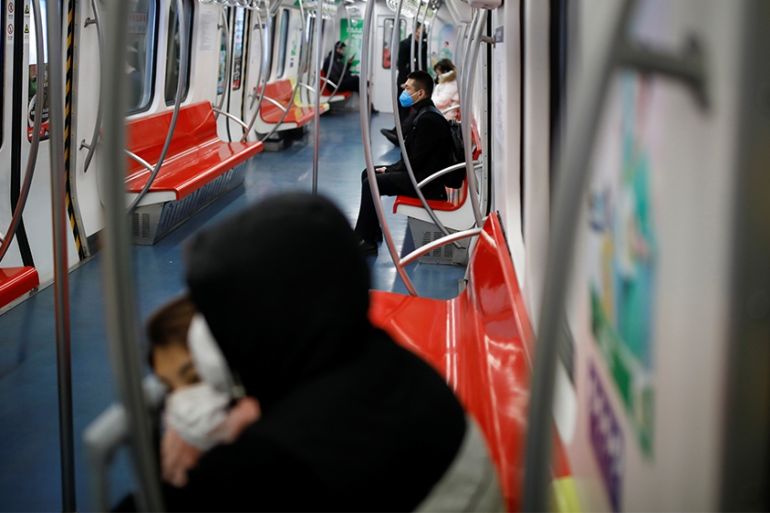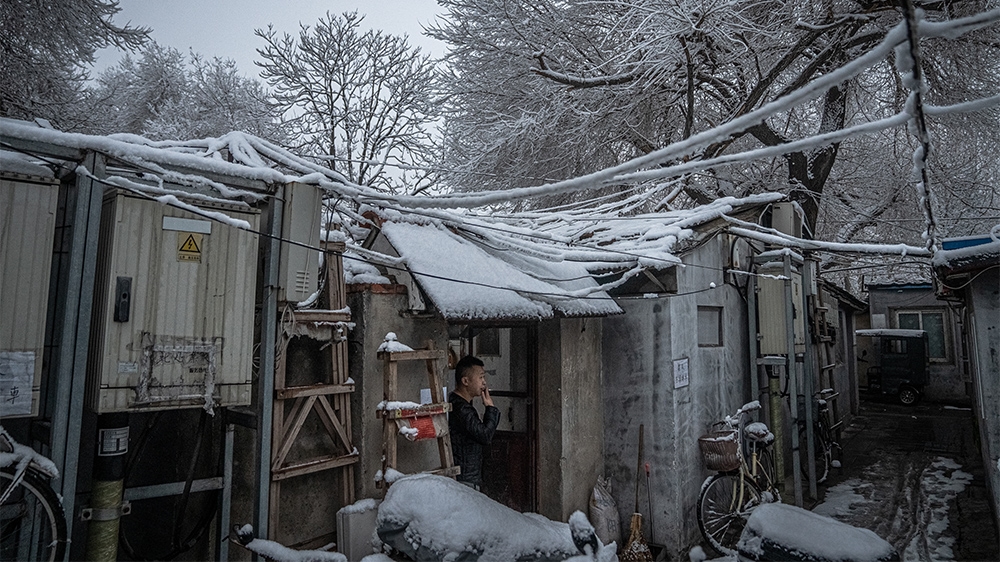‘I want to live’: China’s workers struggle amid virus shutdown
Chinese in informal work are struggling to make ends meet as coronavirus empties streets and shuts down businesses.

Beijing, China – On Tuesday morning, Lanying Guo began work at her small dumpling restaurant in a Beijing alleyway – just as she had for the previous seven days.
With people advised to stay indoors to minimise the spread of the coronavirus, Guo had earned a pittance the previous week. But she was hoping for more customers on Tuesday as more people were supposed to be back at work after the Lunar New Year holiday.
Keep reading
list of 3 itemsHow dangerous is the new coronavirus?
How does coronavirus spread and how can you protect yourself?
But the alley remained eerily quiet.
To control the transmission of the virus, municipal officials in Beijing extended the Lunar New Year holiday and told employees to work from home, as was the case in many other Chinese provinces and municipalities.
“In order to further ensure the containment of the novel coronavirus outbreak, all employees, excluding essential personnel supporting the government services, are expected to return to work on February 10th,” the statement from the Beijing municipality government read.
But that meant hardly any customers for Guo.
“I haven’t really earned any money for almost two weeks now, and I don’t know how long I can last,” she said as she wept. “I want to live.”

Guo is in the last stage of kidney failure and has been on dialysis for four years. A divorcee without any children, she has to be entirely self-sufficient – but she still needs to go to hospital three days a week for treatment. Without daily earnings to pay for her doctor’s visits, she would not live long.
‘They see us as viruses’
The coronavirus is expected to take a substantial toll on China’s economy, but for low-income, informal workers such as Guo, the loss of income can be far more devastating.
According to the International Labour Organization (ILO), 54.5 percent of Chinese workers such as couriers and construction workers are employed in informal sectors. Others are self-employed. Without a stable income or contractual insurance, these workers are the first to be hit in any economic downturn.
“There is this constant struggle between maximising the effort to contain the outbreak and minimising the economic impact whatever measures we take will have on both the macroeconomy and ordinary people’s lives,” said Shao’an Huang, a professor of economics at China’s Central University of Finance and Economics.
In Jun Xiang’s case, the government’s virus containment efforts affect not just him, but his entire family.
Before the outbreak began, he worked in Wuhan as a construction worker but returned to his hometown in Hunan province for the Lunar New Year. Then Wuhan was sealed off. Now he worries about finding enough money to feed his family and keeping his daughter in school.
“I helped building the Wuhan’s Greenland Centre,” Xiang said proudly over the phone, referring to an as-yet-unfinished skyscraper in Wuhan. Construction workers normally get paid by the hour or by the day. If they do not work, they are not paid.

“Honestly, if I could go back, I would, because my daughter needs to go to school,” he said, sighing. “Nobody would hire me here in Hunan, either. They all see us as viruses.”
Xiang is the family’s sole breadwinner. If he remains stuck in Hunan without being able to find work, his whole family would starve, he said.
Subsidy proposal
Guo and Xiang are just two among the hundreds of millions of people who live on the economic margins in China.
Analysts have proposed that the authorities subsidise low-income groups and provide sweeteners for people to stay at home as the lockdown continues.
“The government should ensure low-income groups and jobless people enjoy a stable level of livelihood without being impacted by the outbreak,” said Hongze Ren, director of Tsinghua University’s Hengda Economy Research Institute. “It’s also the government’s responsibility to prepare for the possible social instability as a result of the economic hardships.”
According to the latest data released by China’s Bureau of Statistics, the average annual disposable income among all people in China was 22,832 Yuan ($3,262) in 2019, but more than 60 percent of the population has less than that.
Ren said no matter how the government planned to mitigate the harm done to susceptible groups, it needed to act fast. “As the policies are being debated, people’s lives don’t get put on pause,” he said.
As the number of people in China affected by the coronavirus continues to rise, workers such as Guo or Xiang might find it hard to obey government edicts to stay home.
“People say that I am irresponsible if I don’t stay at home, I get it,” Guo said, as she recounted the gossip she had heard from her neighbours.
“But maybe they don’t understand what money means to me – it means life.”